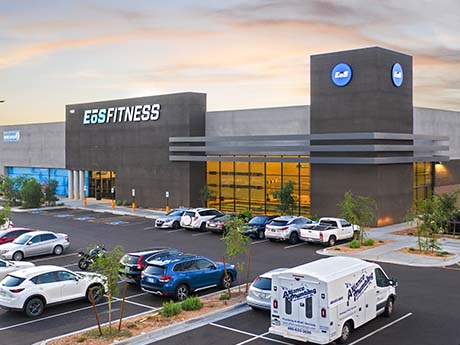By Jason Baker, principal at Baker Katz
When a national retail or restaurant brand acquires another prominent national name, the move might initially seem to make a great deal of sense — especially when there are clear similarities between the two brands.
Ultimately, however, what makes these high-profile transactions successful may turn out to be less about brand synergy and more about market dynamics and commercial real estate leverage. Accepting that premise in turn raises some interesting questions about the role that these types of acquisitions and brand conversions might play in an increasing competitive commercial real estate landscape.

Those questions are especially relevant in places like Texas, where retailers looking to expand or move into new markets may view the acquisition and conversion of struggling retail brands as a viable strategy. From fitness concepts to coffee chains, there may be opportunities retailers can leverage to find quality retail spaces in otherwise occupied marketplaces.
Some of these acquisitions have already taken place. However, questions remain about how much of a role these conversions may play in Texas markets. The phenomenon is hardly a new one, but it does seem like a noteworthy trend for industry analysts, retailers and brokers alike to keep an eye on.
There is value in understanding what makes these situations unique and what potential advantages — and challenges — they present. When these acquisitions and conversions do happen, they can potentially reveal information about the fates and fortunes of not just individual brands, but the industry as a whole.
What Are You Really Buying?
There are plenty of examples in recent years that are instructive with respect to where value originates from these transactions.
In more than a few cases, it became clear that the true value of newly acquired locations was in the real estate itself. A buyer in possession of a long list of new locations that were already ideally suited to what they were looking for and where they wanted to be is obviously in a strong position.
It’s a position that may essentially enable brands to skip over the tedious and time-consuming process of identifying the right markets for expansion, zeroing in on the right locations, negotiating leases and doing all the heavy lifting that comes with any significant expansion initiative. With the stroke of a pen, some buyers have been able to achieve in one acquisition what could have taken many years to accomplish otherwise.
Goes Both Ways
The recently announced multi-unit acquisition of several Houston-area Texans Fit locations by EōS Fitness shows that these acquisitions and conversions don’t have to be national-scale transactions to be impactful. This deal also illustrates how the same sites — Texans Fit had itself backfilled a number of 24 Hour Fitness locations — can retain their appeal to different brands in the same retail segment.
While the internal deliberations and negotiations surrounding these acquisitions are, unsurprisingly, not typically made public, it’s also true that it isn’t always the acquiring brand who initiates those conversations. Struggling brands might see an acquisition as a lifeline. Even brands that are not necessarily struggling, but face the prospect of a strong competitor moving into the market, may decide that concession is the better part of valor.
Internal Conversions
Another manifestation of the brand conversion dynamic doesn’t involve any money actually changing hands. These “internal conversions” provide opportunities for established retailers to roll out new concepts with a lower level of up-front investment and risk.
For example, athletic equipment and apparel giant Dick’s Sporting Goods is in the process of closing its Field & Stream locations and converting many to its new House of Sport concept. Similarly, Target continues to experiment with new formats under the same brand name. The Minneapolis-based discount retailer is converting existing spaces rather than acquiring new ones and undertaking other innovations like including new sub-stores inside the store and expanding spaces for fulfillment.
A Broker’s Opinion
One noteworthy element of these unique and impactful transactions is that brokers can sometimes play a unique role in the process.
While a lot of these acquisition-and-conversion transactions are driven by principals directly, a broker may be called upon to provide an opinion of values for recently acquired assets, answer questions about viability and illuminate the prospects for closing versus conversion. Brokers can also bring value by way of knowledge and trends in the trade area, sharing development activity they are seeing with local and regional players, making brand introductions and facilitating the touring of assets.
Trend Lines
The big question is whether an increasingly crowded commercial real estate landscape and a volatile and uncertain economic outlook will lead to more acquisitions and conversions in lieu of traditional retail expansions. The big answer is…maybe. These conditions will almost certainly continue to be factors, especially in some of the more crowded and competitive Texas markets, where quality spaces are hard to come by.
There are a couple of important considerations to keep in mind, however. One is that some expansion-minded retail decision-makers might see pessimistic economic forecasts heralding new acquisition opportunities on the horizon, potentially creating opportunities to enter new markets for a lot less than building ground-up.
The flip-side argument centers on the fact that many operators were expressing similar sentiments in the early months of 2020. While there was some pandemic fallout, store closures never materialized anywhere near like people thought they would.
Another issue is that while some acquisitions and conversions may have a big local or national impact here in Texas, they are often driven by national factors. It isn’t just bankruptcies that lead to these deals; a thriving Houston chain may be struggling in other markets around the country.
Whatever happens, these unique transactions will continue to reveal a great deal about the contours of the commercial market — and the mindset of the retail decision-makers who help shape it.
Jason Baker is Principal at Houston-based Baker Katz, a full-service commercial real estate brokerage firm. To connect with Jason directly, email jbaker@bakerkatz.com.


